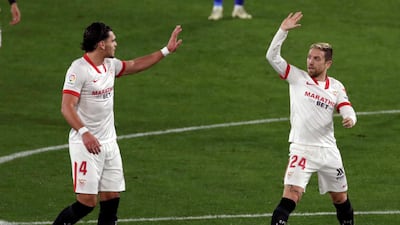It’s a storyline with echoes: a brilliant Argentinian, the heart and soul of his club, drops a bombshell. His relationship with the management has deteriorated so far, he says, he feels he must leave. It seems unimaginable. For other clubs, he looks like a wonderful opportunity.
No, this is not the tale of Lionel Messi and Barcelona, which is an ongoing story of rancour with the boardroom and, at this stage, a temporary truce, with the player still dazzling on the pitch. This story is of a rift that led to one of the more significant moves of a quiet January transfer window – Papu Gomez's transfer from Atalanta to Sevilla.
Gomez, 32, is not Messi. Indeed, were it not for Messi owning Argentina’s number 10 jersey for the best part of 15 years, Papu might have won more than his mere five international caps.
On his day, the impish Papu is one of the game’s genuinely magical playmakers. Since 2014 he has been inspiring Atalanta, driving the Italian club’s rise from lower-half-of-the-table Serie A to breath-of-fresh-air in Europe.
He wore the captain’s armband as Atalanta came within minutes of a semi-final in the Champions League last August, in their first ever adventure in the competition.
But as they wrapped up the group phase of their second Champions League campaign, back in December, a schism emerged, with skipper Papu – he is usually known by his nickname – on one side, and head coach Gian Piero Gasperini on the other.
There were tactical disagreements. They developed into angry confrontations. Papu saw an exit as the only solution. He is not Messi, but, like Messi, he had high status at his club, and felt it had been diminished.
________________
Barcelona ratings v Real Betis
________________
There were several suitors, but Sevilla, masters of recruitment, know a gift when they see one in the market and how to persuade a footballer to join them.
They had snapped up 32-year-old Ivan Rakitic, in the previous transfer window when Barcelona wanted the Croatian off their wage-bill; top scorer Youssef En-Nesyri came in the window before that.
The club’s series of Europa League titles are the yield of their agility in the marketplace. Buying Papu looks outstanding business: they paid Atalanta an initial €6m.
Fortune has smiled on him in Spain already. He made his Liga debut at the weekend, in an ill-tempered 3-0 win over Getafe and thanks to a deflection, scored his first Sevilla goal.
He had come on for Lucas Ocampos, injured and now absent for some weeks. Papu now looks forward to a run in the starting XI, and, by the end of the match on Wednesday, perhaps the glimpse of a major trophy. Sevilla host Messi’s Barcelona in the first leg of the Copa del Rey semi-final.
Messi also came off the bench at the weekend, and, in a storyline told hundreds of times, he inspired Barcelona back from the brink. He had been left out of head coach Ronald Koeman’s starting line-up with the imminent Cup semi-final in mind.
His absence simply reminded how indispensable is Barca’s captain, record-breaker and restless superhero. Messi came on with Betis 1-0 up. Two minutes later, he equalised. Nine minutes after that, a uniquely visionary Messi through-ball put Barcelona ahead. Via a stumble, they won 3-2.
It kept Barcelona in second, now with one defeat from their last 16 matches across competitions. Sevilla are fourth, with a single loss in 17. Whoever progresses over the two legs of the Cup – they meet in Catalonia on March 3 – will likely go into the final, against Athletic Bilbao or Levante, as favourites.
It is a priority competition for Koeman. “The quickest route to a trophy is a Cup,” said Koeman, who feels acutely that a trophy is needed at Barcelona after no silverware last season those clear signals from Messi, who asked to quit last summer, that the club’s symptoms of decline are pushing him towards the exit when his contract expires in June.


















